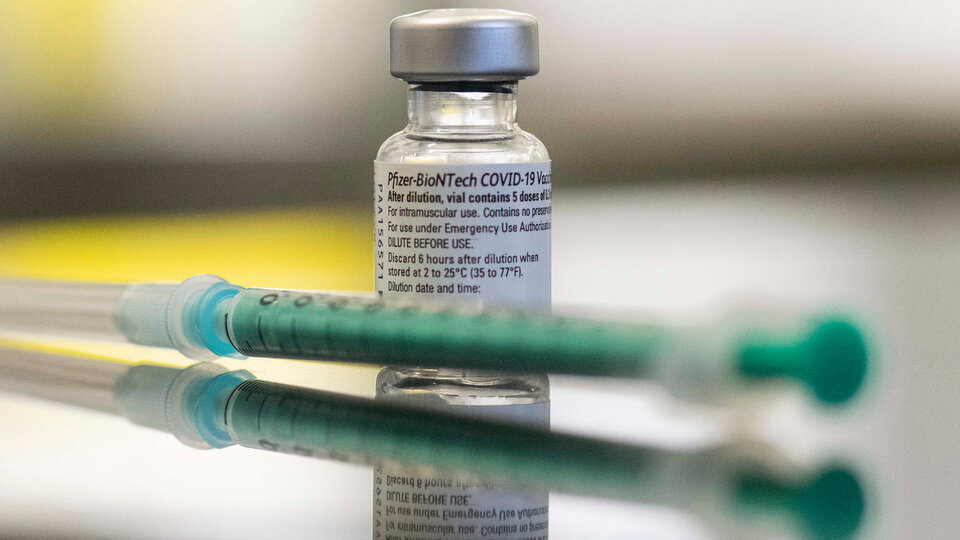
[ad_1]
While in different countries the vaccination campaign against coronavirus, since Israel warned of a possible link between cases of myocarditis, inflammation that occurs in the heart muscle, and application of the second dose of the vaccine Pfizer.
From the Ministry of Health of Israel, they carried out a study which showed the existence of 275 cases of myocarditis identified between December 2020at the start of the vaccination campaign, and May 2021, including 148 cases in the first month after vaccination.
Shortly after the first dose, 27 cases were reported out of a total of 5,401,150 people vaccinated, including 11 vaccinated people with pre-existing conditions.
This number amounted to 121 cases out of a total of 5,049,424 people vaccinated (including 60 vaccinated people with pre-existing pathologies), within 30 days of the second injection.
Until, this phenomenon has been reported mainly in younger men, especially between 16 and 19 years old, usually after the second dose. Most cases have been seen in hospital for up to four days and 95 percent are considered mild cases.
Myocarditis is usually a mild disease, characterized by symptoms such as chest pain, shortness of breath, or rapid heart palpitations, and it usually appears in younger men, between the ages of 16 and 30.
The report shows that the link is stronger between the youngest age group, 16-19 years, compared to other age groups, and that it becomes weaker the more the vaccinated person is old. In most cases, myocarditis has taken the form of a mild illness that resolved within a few days.
Pfizer’s response
Israel’s health ministry has appointed an expanded epidemiological team to investigate a possible link between these cases and the vaccine, established after a quality control committee raised suspicions about such a link and presented its findings to the director general of the health sector.
The epidemiological team is made up of three professional teams: experts in Public Health from the Department of Epidemiology; experts from the National Center for Disease Control and academic experts (representatives from Tel Aviv University, Haifa University and Technion).
After the news, Pfizer issued a statement in which he said he was aware of the Israeli sightings of myocarditis and said a causal link to his vaccine had not been established.
He also said that adverse events are carefully reviewed and that the company meets regularly with the Department of Vaccine Safety of Israel’s Ministry of Health to assess the data.
What they said in Europe and the United States
For its part, European Medicines Agency (EMA) reported last week that myocarditis after the Pfizer vaccine had not been a cause for concern as it continued to occur at a rate that normally affects the general population, while adding that young men were particularly prone to the disease.
On the other hand, an advisory group of the United States Centers for Disease Control and Prevention (CDC). He recommended further studies last month on a possible link between myocarditis and mRNA vaccines, including those from Pfizer and Moderna Inc.
However, the group noted that analysis of another database – Vaccine Safety Datalink (VSD) – did not show that myocarditis or pericarditis rates after COVID-19 vaccination differ from expectations. The VSD has data from nine healthcare organizations and can be used to compare vaccinated and unvaccinated populations.
Why Israel launched the investigation
Recent findings are important because Israel discusses extension of vaccination campaign to include 12-15 year olds in coming days. Some health experts have suggested that only younger people get an injection to avoid side effects from the second dose.
“I can’t imagine this will be something that will make doctors say we shouldn’t be vaccinating children,” he told ScienceMag. Douglas diekema, pediatrician and bioethicist at Seattle Children’s Hospital, after the release of the Israeli report.
As reported by the Israeli Ministry of Health, the recommendation to vaccinate adolescents between the ages of 12 and 15 will be discussed in the Pandemic Containment Working Group forum and subject to the approval of the Director General of the Ministry of Health. Health.
The government of Israel immunizes around 55% of the country’s population, and with the decline in cases and the advancement of the vaccination campaign, restrictions on social distancing and the need for special passes were removed as soon as possible. Tuesday. some restaurants and places.
The remaining precautionary measures are the use of masks indoors, which is also expected to be lifted soon, and quarantine requirements for unvaccinated people entering the country. The number of active cases has fallen to just 356, with only a handful of new cases per day.
.
[ad_2]
Source link
 Naaju Breaking News, Live Updates, Latest Headlines, Viral News, Top Stories, Trending Topics, Videos
Naaju Breaking News, Live Updates, Latest Headlines, Viral News, Top Stories, Trending Topics, Videos